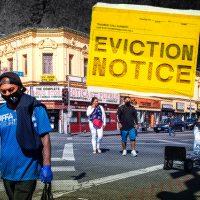As Covid-19 raged in New York City, calls from tenants who said they couldn’t pay rent overwhelmed a tenant hotline.
Some 403 calls to the Metropolitan Council on Housing from March 15 to May 15 were from tenants who said they were unable to pay, a nine-fold increase from 45 during the same period last year.
As calls surged, legislators passed two bills to help with rent, but the Met Council — which aims to remove the profit motive from housing — called the attempts “insufficient” and “deceptively named.”
Read more



In its report, the Met Council blasted the Tenant Safe Harbor Act, which allows money judgments instead of evictions for unpaid rent, and the Emergency Rent Relief Act, which provided housing vouchers to maintain rent levels for tenants who qualify. Both measures were signed into law, while more radical legislation pushed by tenants has not come up for a vote.
The group’s analysis also shows that tenants were confused about the statewide eviction moratorium.
Despite the eviction ban, which went into effect on March 15 and was later renewed but limited — and later superseded by contradictory court directives — 121 tenants called the hotline to voice concerns about being evicted. That was a 22 percent increase from the same period in 2019.
The Met Council extrapolated its hotline data of several hundred calls to conclude that 1.4 million to 1.6 million of New York’s 5.4 million tenants could be struggling to pay rent.
In addition to the hotline data, Met Council surveyed 406 respondents who had previously called to gauge how they were affected by the crisis. Four out of five said they had lost work and slightly more said they had trouble paying rent because of Covid-19.
Those respondents were more likely to already have problems with their housing, the report notes.
The numbers were higher for Latinx persons, who reported a loss in income in 91 percent of responses, while 93 percent said they had difficulty paying rent. The numbers were also higher for those that were severely rent burdened before the pandemic struck, with 92 percent of those respondents reporting difficulty paying rent because of Covid-19.
